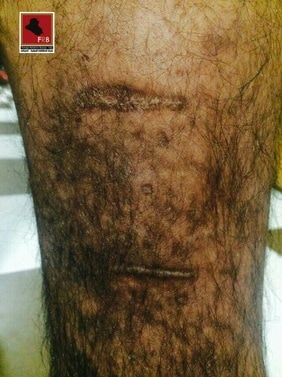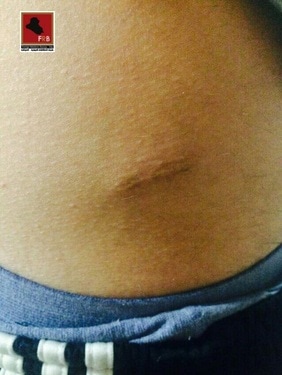Donning civilian clothing, his captors stormed the garage where Al-Noaimi practiced carpentry, and held the thirty-two year old at gun point. In a recently conducted interview with FRB, Al-Noaimi described the scene in which he was "surrounded by ten men, each of whom bore arms”.
"They approached slowly, asking whether I was Ammar, to which I responded 'yes', but before I could make sense of anything” Ammar said,"I was being held down by two men while another handcuffed me".
"The vehicle slowed down preparing to stop at a security checkpoint managed by the interior ministry. But it did not stop for long, nor was it searched. Instead, it was invited to pass through by federal policemen; no questions asked" Al-Noaimi exclaimed. “It was clear that the police and these militias were working hand-in-hand”.
After hitting the road for approximately an hour, "we arrived at a furnished yet uninhabited house” Al-Noaimi said. There, he was blindfolded, and tortured severely in one of the rooms before being ushered into another house where he allegedly saw children and women baking bread.
Every room to which Al-Noaimi was taken to served as a torture chamber, where he was blackened, bruised and injured.
"I heard two of my torturers conversing but it was not entirely clear what they were saying, as they spoke in Farsi”. The young man explained that the identity of his captors was "not all that clear". He questioned whether they were Iranian, or Iraqis communicating in Farsi to prevent him from understanding their exchanges.
Al-Numaini described a third house to which he was moved to. “This situation” he recalled, “played itself out for four days”. He would be blindfolded and taken into different rooms, violently beaten, to the point that he would occasionally "faint from pain".
On the fifth day, Al-Noaimi was taken to an open landfill site. “At first I was certain I didn't not know where I was, later realising that I was in 'Al-Sadaa' area”, in Sadr City, east of Baghdad – “an area where countless of Sunni Iraqis have perished”, he told FRB.
“Following days of merciless torture, I was taken there to die" he said sternly. “To ensure I was dead, one of the captors shot five bullets, three missed, one skimmed my head and the other perforated my stomach. They left me there for dead”.
Al-Noaimi's struggle did not end there. Unable to lift himself off the ground, he tried to appeal to strangers for help, “but", as he remembers, "everyone was too scared”.
“After some time, and elderly man carrying bread walked by. He paused, asked if I needed help, which was followed by the question of whether I was Shi'i or Sunni. I lied and told him I was Shi'i. The man accepted to help, but warned that if the militias found out, he would also be killed”.
“After we arrived at the elderly man's home, I asked if it was possible to make a personal call”. To Al-Noaimi's surprise the old man agreed, and his call was answered. “It was my brother”, he laughed, “but even he was unable to offer immediate assistance in fear of what the militias would do if they discovered I was still alive”. Calls were made by his brother to some friends in Sadr city, arranging for him to be transferred to a safe location.
Once they arrived, he was driven to Beirut square, near Palestine street, greeted by his brother-in-law and other relatives, before they drove to his sister's home in Saydiyya, where he received medical treatment for his life-threatening wounds. “It was far too risky to venture to the hospital” he said, “out of fear of being abducted, or even the questions I could have been asked”.
For the next two years, Al-Noaimi lived the life of a man on the run. It did not take long for the militias to uncover that he had survived the attempted assassination. They searched everywhere for him, adamant on finishing the job they had started.
After he had made a full recovery and was able to stand on his own two feet, Al-Noaimi fled to Turkey, and later to Finland where he arrived in September last year.
There, Al-Noaimi faces a different set of problems; mainly the battle to remain, as the number of asylum applications rejected by Finnish authorities rises by the day. The move to deport him, as he describes, would be equal to the death sentence of an innocent man. “My death”, he says, is almost certain, if forced back home to Iraq.




 RSS Feed
RSS Feed